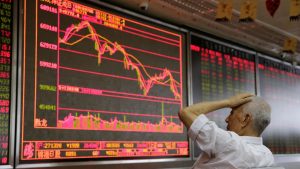


An investor reacts to stock market information in Beijing as the US tariffs come into effect
The International Monetary Fund (IMF) has taken aim at Brexit and the US trade war with China, warning that “the world will be a poorer and more dangerous place” without multilateralism.
The fund’s economic counsellor Maurice Obstfeld, who is retiring at the year’s end, made the remarks while outlining downgrades to global growth for 2018 and 2019 in its latest World Economic Outlook.
The report, published at a meeting in Bali, showed the IMF was now predicting economic growth of 3.7% this year – down from the 3.9% it had forecast in July.
The IMF said the tit-for-tat tariffs imposed by the US and China, weaker performances by eurozone countries, Japan and Britain all conspired to increase pressure on the global economy, while “the possible failure of Brexit negotiations poses another risk”.
It said the lack of progress in UK/EU discussions had created “pervasive uncertainty” about future trade costs.
“An intensification of trade tensions and the associated further rise in policy uncertainty could dent business and financial market sentiment, trigger financial market volatility, and slow investment and trade,” the report said.
“An increase in trade barriers would disrupt global supply chains, which have become an integral part of production processes in the past decades, and slow the spread of new technologies, ultimately lowering global productivity and welfare.
“It would also make tradeable consumer goods less affordable, harming low-income households disproportionately.”
The IMF predicted UK growth to would be 1.4% in 2018, rising to 1.5% in 2019, while the eurozone 2018 growth forecast was cut to 2% from 2.2%.
Germany, the economic powerhouse of Europe, could be particularly hard hit by a drop in manufacturing orders and trade volumes, it said.
The US growth forecast for 2019 is down from 2.7% to 2.5%.
China’s growth is still expected to be more than 6% next year, but Mr Obstfeld warned Beijing to concentrate on quality and sustainability of growth, not quantity of growth.
“US growth will decline once parts of its fiscal stimulus go into reverse,” he said in a statement.
“Notwithstanding the present demand momentum, we have downgraded our 2019 US growth forecast owing to the recently enacted tariffs on a wide range of imports from China and China’s retaliation.”
He also pointed to risks from mounting debts in emerging market economies struggling with tighter liquidity and capital outflows as the US dollar strengthens.
Commenting on the global picture, he said: “To gauge the severity of the threats to growth, one must ask how governments could respond if risks are realised and widespread recession ensues.
“The answer is not comforting. Mechanisms of multilateral global policy cooperation are under strain, notably in trade, and need strengthening.”
The IMF recommended the UK should look at easing planning restrictions to boost housing supply, improve the quality of transport infrastructure, and facilitate the relocation of workers in industries that are likely to be more affected by higher trade barriers after Brexit.
It also said interest rates would need to rise to curb inflation, but urged the Bank of England to remain “flexible” depending on what happens with Brexit.
The report said: “In the United Kingdom, where the output gap is closed and unemployment is low, a modest tightening of monetary policy may be warranted, although at a time of heightened uncertainty, monetary policy should remain
flexible in response to changing conditions associated with the Brexit negotiations.” – news.sky.com